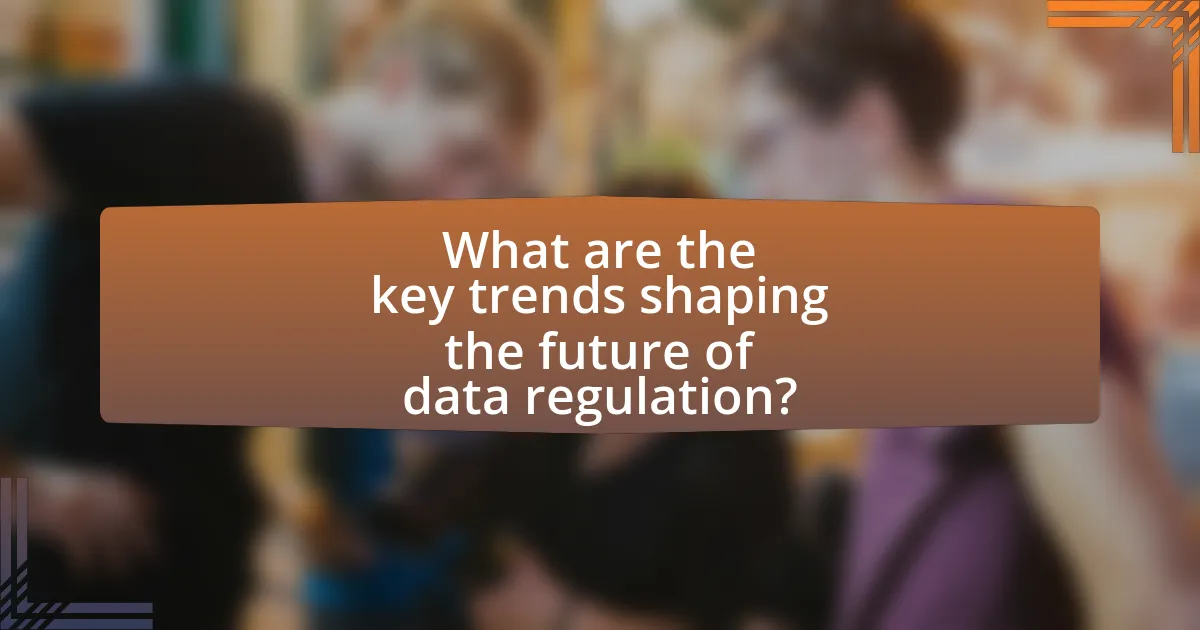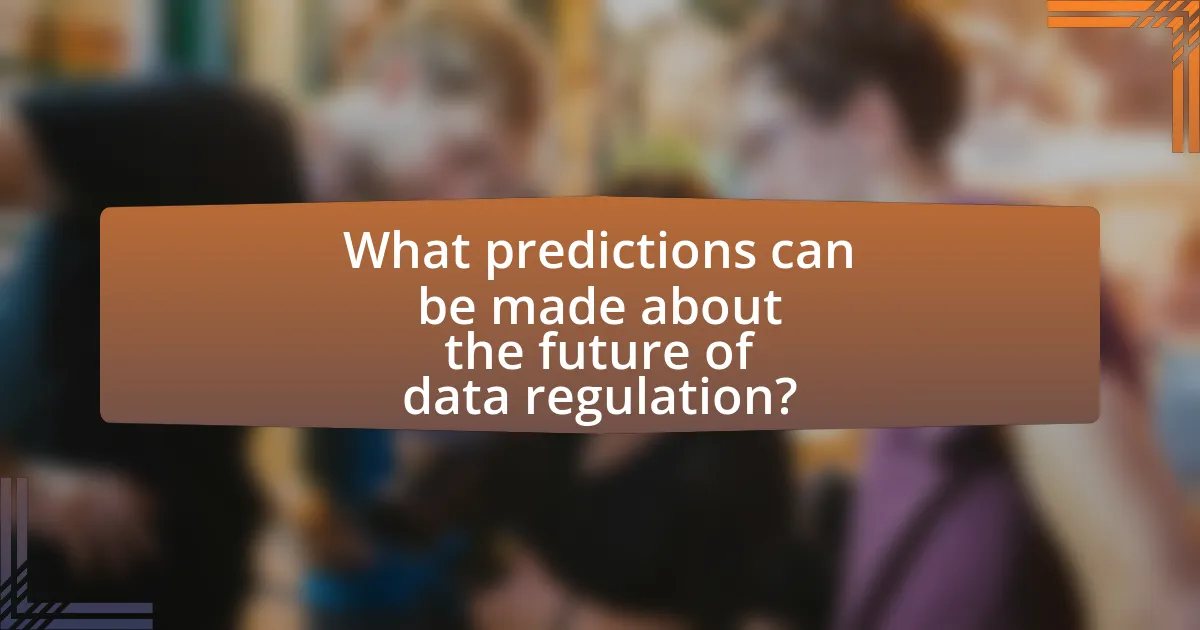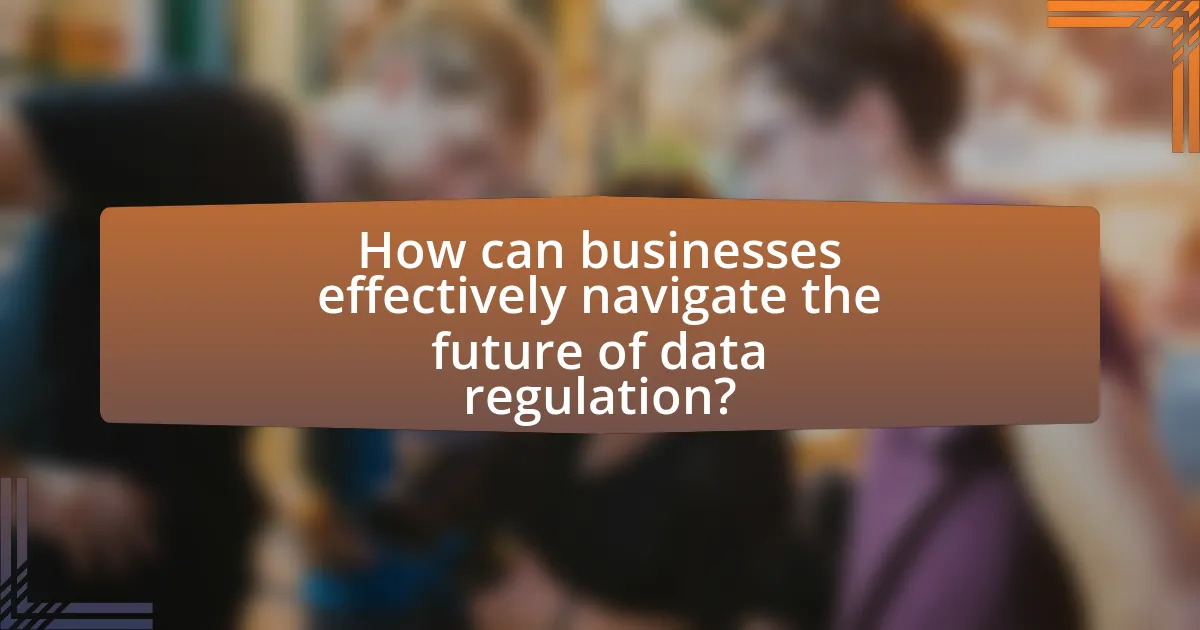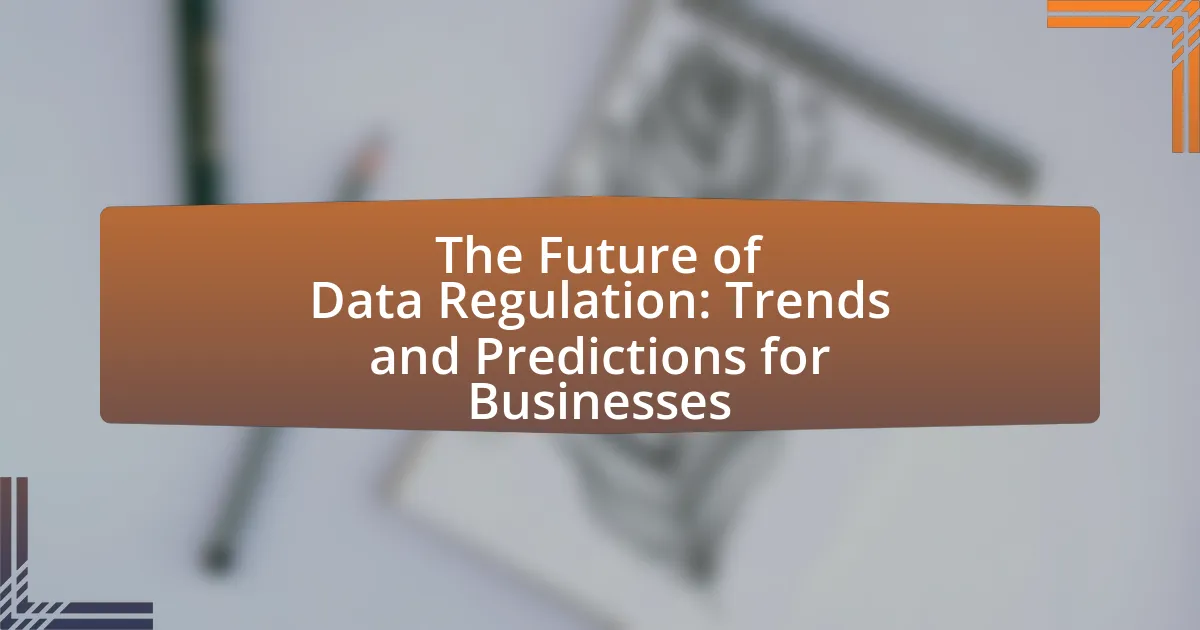The article focuses on the future of data regulation, highlighting key trends such as increased consumer privacy emphasis, data sovereignty, and stricter compliance requirements. It examines the influence of technological advancements, particularly artificial intelligence and blockchain, on regulatory frameworks. The piece also discusses global movements like the GDPR and CCPA, the role of consumer advocacy, and the impact of international agreements on local laws. Additionally, it outlines compliance strategies for businesses, potential challenges, and the importance of proactive engagement with regulators to navigate the evolving landscape of data regulation effectively.

What are the key trends shaping the future of data regulation?
Key trends shaping the future of data regulation include increased emphasis on consumer privacy, the rise of data sovereignty, and the implementation of stricter compliance requirements. Consumer privacy is becoming paramount as regulations like the GDPR in Europe and CCPA in California set high standards for data protection, compelling businesses to adopt transparent data practices. Data sovereignty is gaining traction as countries implement laws requiring data to be stored and processed within their borders, impacting global data flows. Additionally, stricter compliance requirements are emerging, with regulators demanding more accountability and transparency from organizations regarding their data handling practices, as evidenced by the growing number of enforcement actions and fines for non-compliance.
How are technological advancements influencing data regulation?
Technological advancements are significantly influencing data regulation by necessitating more robust frameworks to address emerging challenges such as data privacy, security, and ethical use. For instance, the rise of artificial intelligence and machine learning has prompted regulators to consider new guidelines that ensure transparency and accountability in automated decision-making processes. Additionally, the proliferation of data breaches has led to stricter compliance requirements, as seen in regulations like the General Data Protection Regulation (GDPR) enacted in the European Union, which imposes heavy fines for non-compliance. These advancements compel regulators to adapt continuously, ensuring that laws keep pace with the rapid evolution of technology and its implications for personal data.
What role does artificial intelligence play in data regulation?
Artificial intelligence plays a crucial role in data regulation by enhancing compliance, automating monitoring processes, and improving data governance. AI technologies can analyze vast amounts of data to identify patterns and anomalies, which helps organizations adhere to regulations such as GDPR and CCPA. For instance, AI-driven tools can automatically flag non-compliance issues, thereby reducing the risk of penalties. Additionally, AI can facilitate real-time reporting and auditing, ensuring that businesses maintain transparency and accountability in their data practices. This capability is supported by studies showing that organizations utilizing AI for compliance see a significant reduction in regulatory breaches, thereby reinforcing the importance of AI in effective data regulation.
How is blockchain technology impacting data privacy laws?
Blockchain technology is significantly impacting data privacy laws by introducing decentralized data management, which challenges traditional regulatory frameworks. The immutable nature of blockchain ensures that once data is recorded, it cannot be altered or deleted, raising questions about compliance with laws like the General Data Protection Regulation (GDPR), which includes the right to erasure. Furthermore, the transparency of blockchain can conflict with privacy requirements, as personal data may be exposed on public ledgers. As a result, regulators are compelled to adapt existing laws or create new regulations that address these unique characteristics of blockchain, ensuring that data privacy is maintained while leveraging the benefits of this technology.
What global movements are affecting data regulation policies?
Global movements affecting data regulation policies include the General Data Protection Regulation (GDPR) in Europe, the California Consumer Privacy Act (CCPA) in the United States, and the push for data localization in various countries. GDPR, implemented in 2018, set a high standard for data protection and privacy, influencing regulations worldwide by emphasizing user consent and data rights. The CCPA, effective from 2020, introduced similar consumer rights in California, prompting other states to consider similar legislation. Additionally, countries like Russia and China are advocating for data localization, requiring data to be stored within national borders, which impacts global data transfer practices. These movements collectively shape the landscape of data regulation, driving businesses to adapt to varying compliance requirements across jurisdictions.
How are international agreements shaping local data laws?
International agreements are significantly influencing local data laws by establishing common standards and frameworks that countries adopt to ensure compliance with global norms. For instance, the General Data Protection Regulation (GDPR) enacted by the European Union has prompted many nations to revise their data protection laws to align with its stringent requirements, thereby enhancing privacy protections and accountability. This alignment is evident as countries like Brazil and India have introduced or updated their data protection legislation, inspired by GDPR principles, to facilitate international trade and cooperation. Such international agreements create a ripple effect, encouraging local jurisdictions to harmonize their laws to attract foreign investment and ensure interoperability in a global digital economy.
What is the impact of consumer advocacy on data regulation trends?
Consumer advocacy significantly influences data regulation trends by driving demand for stronger privacy protections and transparency in data handling. Advocacy groups, such as the Electronic Frontier Foundation and Privacy International, have raised public awareness about data misuse, leading to legislative changes like the General Data Protection Regulation (GDPR) in Europe and the California Consumer Privacy Act (CCPA) in the United States. These regulations emerged in response to consumer pressure for accountability from companies regarding personal data usage, demonstrating that consumer advocacy can effectively shape regulatory frameworks to prioritize individual rights and data security.
What are the emerging regulatory frameworks for data protection?
Emerging regulatory frameworks for data protection include the General Data Protection Regulation (GDPR) in Europe, the California Consumer Privacy Act (CCPA) in the United States, and the proposed Data Protection Act in India. These frameworks establish comprehensive guidelines for data collection, processing, and user consent, aiming to enhance individual privacy rights and impose stricter penalties for non-compliance. For instance, GDPR, which came into effect in May 2018, mandates that organizations must obtain explicit consent from users before processing their personal data and grants individuals the right to access and delete their data. Similarly, CCPA, effective from January 2020, allows California residents to know what personal data is being collected and to whom it is being sold, along with the right to opt-out of such sales. These frameworks reflect a global trend towards stronger data protection measures, driven by increasing public awareness and demand for privacy rights.
How do GDPR and CCPA set the stage for future regulations?
GDPR and CCPA establish foundational frameworks for future data privacy regulations by emphasizing consumer rights and data protection. GDPR, implemented in 2018, introduced stringent requirements for data handling, including explicit consent and the right to access personal data, influencing global standards. CCPA, enacted in 2020, further advanced consumer rights by allowing Californians to know what personal data is collected and to opt-out of its sale. These regulations have prompted other jurisdictions to consider similar laws, as evidenced by ongoing legislative efforts in states like Virginia and Colorado, which reflect the principles set forth by GDPR and CCPA. Consequently, the global trend towards enhanced data privacy is likely to continue, driven by the precedents established by these two landmark regulations.
What lessons can be learned from recent data breaches and their regulations?
Recent data breaches highlight the critical importance of robust cybersecurity measures and compliance with regulations. Organizations must prioritize data protection strategies, as evidenced by the 2021 Facebook breach, which exposed the personal information of over 530 million users, underscoring the need for stringent data handling practices. Additionally, regulations like the General Data Protection Regulation (GDPR) impose significant penalties for non-compliance, reinforcing the necessity for businesses to implement comprehensive data governance frameworks. The lessons learned emphasize that proactive risk management and adherence to legal standards are essential to mitigate the impact of potential breaches and protect consumer trust.

What predictions can be made about the future of data regulation?
Predictions about the future of data regulation indicate an increase in stringent laws and frameworks aimed at protecting consumer privacy and data security. As seen with the implementation of the General Data Protection Regulation (GDPR) in Europe, similar regulations are likely to emerge globally, driven by public demand for transparency and accountability from organizations handling personal data. Additionally, advancements in technology, such as artificial intelligence and machine learning, will necessitate adaptive regulatory measures to address new challenges in data usage and protection. The trend towards greater collaboration between governments and tech companies is expected to shape a more cohesive regulatory landscape, ensuring compliance while fostering innovation.
How will businesses need to adapt to evolving data regulations?
Businesses will need to implement robust data governance frameworks to adapt to evolving data regulations. This includes establishing clear data management policies, ensuring compliance with laws such as the General Data Protection Regulation (GDPR) and the California Consumer Privacy Act (CCPA), and investing in technology that enhances data security and privacy. For instance, a report by the International Association of Privacy Professionals (IAPP) indicates that organizations prioritizing compliance can reduce the risk of costly fines, which can reach up to 4% of annual global turnover under GDPR. Additionally, businesses must train employees on data handling practices and continuously monitor regulatory changes to remain compliant, as regulations are increasingly dynamic and complex.
What compliance strategies should businesses implement now?
Businesses should implement data protection impact assessments (DPIAs), regular compliance audits, and employee training programs as compliance strategies now. DPIAs help identify and mitigate risks associated with data processing activities, ensuring adherence to regulations like GDPR. Regular compliance audits allow businesses to assess their current practices against legal requirements, identifying gaps and areas for improvement. Employee training programs are essential for fostering a culture of compliance, equipping staff with the knowledge to handle data responsibly and understand regulatory obligations. These strategies collectively enhance a business’s ability to navigate the evolving landscape of data regulation effectively.
How can businesses leverage data regulation as a competitive advantage?
Businesses can leverage data regulation as a competitive advantage by ensuring compliance and building trust with consumers. By adhering to regulations such as the General Data Protection Regulation (GDPR), companies can differentiate themselves in the marketplace, as compliance demonstrates a commitment to data privacy and security. This can lead to increased customer loyalty; for instance, a 2020 survey by Cisco found that 84% of consumers care about data privacy and are more likely to engage with brands that prioritize it. Additionally, businesses that proactively implement data governance frameworks can mitigate risks associated with data breaches, potentially saving costs related to fines and reputational damage. Thus, leveraging data regulation not only enhances brand reputation but also fosters customer relationships, ultimately driving competitive advantage.
What potential challenges will businesses face with new regulations?
Businesses will face several potential challenges with new regulations, including compliance costs, operational disruptions, and the need for ongoing training. Compliance costs can significantly increase as businesses invest in systems and processes to meet regulatory requirements, which can strain financial resources. Operational disruptions may occur as companies adjust their practices to align with new rules, potentially leading to inefficiencies or delays in service delivery. Additionally, the necessity for ongoing training to ensure employees understand and adhere to new regulations can divert time and resources from core business activities. These challenges are evident in various sectors, such as the financial industry, where the implementation of regulations like the Dodd-Frank Act has resulted in substantial compliance expenditures and operational adjustments.
How can businesses prepare for increased regulatory scrutiny?
Businesses can prepare for increased regulatory scrutiny by implementing robust compliance programs and conducting regular audits. Establishing a compliance framework ensures that organizations adhere to relevant laws and regulations, reducing the risk of violations. Regular audits help identify potential compliance gaps and allow businesses to address them proactively. According to a report by the Association of Certified Fraud Examiners, organizations with strong compliance programs can reduce the likelihood of regulatory penalties by up to 50%. Additionally, training employees on compliance and ethical standards fosters a culture of accountability, further mitigating risks associated with regulatory scrutiny.
What are the risks of non-compliance in the future regulatory landscape?
Non-compliance in the future regulatory landscape poses significant risks, including substantial financial penalties, legal repercussions, and reputational damage. Businesses that fail to adhere to evolving regulations may face fines that can reach millions of dollars, as seen in cases like the GDPR enforcement, where companies have been fined up to 4% of their annual global turnover for violations. Additionally, non-compliance can lead to lawsuits and increased scrutiny from regulatory bodies, which can disrupt operations and lead to costly legal battles. Furthermore, the erosion of consumer trust can occur, as customers increasingly prioritize data privacy and security; a survey by PwC indicated that 85% of consumers will not do business with a company if they have concerns about its data practices. Thus, the risks of non-compliance are multifaceted and can severely impact a business’s viability and market position.
What role will government play in shaping future data regulations?
The government will play a crucial role in shaping future data regulations by establishing legal frameworks that protect consumer privacy and promote data security. Governments are increasingly recognizing the need for comprehensive data protection laws, as evidenced by the implementation of regulations like the General Data Protection Regulation (GDPR) in the European Union, which sets a global standard for data privacy. Additionally, governments will likely engage in ongoing dialogue with stakeholders, including businesses and civil society, to adapt regulations to emerging technologies and data practices. This collaborative approach aims to balance innovation with the protection of individual rights, ensuring that regulations remain relevant in a rapidly evolving digital landscape.
How might government policies evolve in response to technological changes?
Government policies are likely to evolve by becoming more adaptive and proactive in addressing the implications of technological changes. As technology advances, particularly in areas like artificial intelligence, data privacy, and cybersecurity, governments may implement regulations that prioritize consumer protection, data security, and ethical standards. For instance, the General Data Protection Regulation (GDPR) in the European Union exemplifies how legislation can respond to the need for stricter data privacy measures in the digital age. Additionally, as new technologies emerge, such as blockchain and machine learning, policies may be developed to ensure transparency and accountability in their use, reflecting a shift towards a more dynamic regulatory framework that can keep pace with rapid technological advancements.
What influence do lobbying efforts have on data regulation outcomes?
Lobbying efforts significantly influence data regulation outcomes by shaping legislative priorities and outcomes in favor of specific interests. For instance, technology companies often engage in lobbying to advocate for less stringent data privacy regulations, arguing that such measures could stifle innovation. According to a report by the Center for Responsive Politics, in 2020, the tech industry spent over $20 million on lobbying efforts related to data privacy legislation. This financial investment allows companies to gain access to policymakers, thereby increasing their chances of influencing regulatory frameworks that align with their business objectives.

How can businesses effectively navigate the future of data regulation?
Businesses can effectively navigate the future of data regulation by implementing robust compliance frameworks and staying informed about evolving legal standards. Establishing a dedicated compliance team ensures that organizations can monitor changes in regulations, such as the General Data Protection Regulation (GDPR) and the California Consumer Privacy Act (CCPA), which have set precedents for data protection globally. Regular training for employees on data handling practices and privacy policies further strengthens compliance efforts. Additionally, leveraging technology, such as data management platforms that facilitate transparency and accountability, can help businesses adapt to regulatory changes efficiently. According to a report by the International Association of Privacy Professionals (IAPP), organizations that proactively engage in compliance measures are better positioned to mitigate risks associated with data breaches and regulatory penalties.
What best practices should businesses adopt for data compliance?
Businesses should adopt a comprehensive data compliance strategy that includes regular audits, employee training, and robust data protection measures. Regular audits help identify compliance gaps and ensure adherence to regulations such as GDPR and CCPA, which mandate strict data handling practices. Employee training is essential to foster a culture of compliance, as informed staff are less likely to make errors that could lead to data breaches. Implementing robust data protection measures, including encryption and access controls, safeguards sensitive information against unauthorized access and breaches. According to a report by the Ponemon Institute, organizations that invest in data protection measures can reduce the cost of data breaches by an average of $1.23 million.
How can businesses implement effective data governance frameworks?
Businesses can implement effective data governance frameworks by establishing clear policies, assigning data stewardship roles, and utilizing technology for data management. Clear policies define data ownership, usage, and compliance requirements, ensuring all employees understand their responsibilities. Assigning data stewardship roles involves designating individuals or teams responsible for data quality, security, and compliance, which fosters accountability. Utilizing technology, such as data management platforms and analytics tools, streamlines data governance processes and enhances visibility into data assets. According to a 2021 survey by the Data Governance Institute, organizations with formal data governance frameworks reported a 30% improvement in data quality and compliance adherence, demonstrating the effectiveness of structured governance approaches.
What training and resources are essential for compliance teams?
Compliance teams require training in regulatory frameworks, risk management, and data protection laws, along with resources such as compliance management software and access to legal databases. Training programs should cover specific regulations like GDPR and HIPAA, ensuring team members understand compliance requirements and best practices. Resources like compliance management tools facilitate tracking and reporting, while legal databases provide up-to-date information on evolving regulations. These elements are essential for maintaining compliance and mitigating risks associated with data regulation.
What tools and technologies can assist in data regulation compliance?
Data regulation compliance can be assisted by tools and technologies such as data management platforms, compliance management software, and encryption technologies. Data management platforms, like Informatica and Talend, help organizations organize and manage data in accordance with regulations such as GDPR and CCPA. Compliance management software, such as OneTrust and TrustArc, provides frameworks for tracking compliance requirements and automating reporting processes. Encryption technologies, including AES and RSA, protect sensitive data, ensuring that it remains secure and compliant with regulations. These tools collectively enhance an organization’s ability to meet regulatory standards effectively.
How can automation streamline compliance processes?
Automation can streamline compliance processes by reducing manual tasks, enhancing accuracy, and ensuring timely reporting. By implementing automated systems, organizations can efficiently monitor regulatory changes and maintain compliance with minimal human intervention. For instance, a study by Deloitte found that automation can reduce compliance costs by up to 30% and improve the speed of compliance reporting by 50%. This efficiency not only minimizes the risk of human error but also allows compliance teams to focus on strategic initiatives rather than routine tasks.
What role do data management platforms play in regulatory adherence?
Data management platforms (DMPs) play a crucial role in regulatory adherence by ensuring that organizations can effectively collect, store, and manage data in compliance with legal standards. These platforms facilitate data governance by providing tools for data classification, access control, and audit trails, which are essential for meeting regulations such as GDPR and CCPA. For instance, DMPs enable businesses to track consent for data usage, ensuring that personal data is handled according to regulatory requirements. Additionally, they support data quality management, which is vital for maintaining accurate records and minimizing the risk of non-compliance penalties.
What are the key takeaways for businesses regarding future data regulation?
Businesses must prioritize compliance with evolving data regulations to mitigate legal risks and enhance consumer trust. As governments worldwide implement stricter data protection laws, such as the General Data Protection Regulation (GDPR) in Europe and the California Consumer Privacy Act (CCPA) in the United States, organizations must adapt their data handling practices accordingly. Failure to comply can result in significant fines; for instance, GDPR violations can lead to penalties of up to 4% of annual global revenue. Additionally, businesses should invest in robust data governance frameworks and employee training to ensure adherence to these regulations. By proactively addressing data privacy concerns, companies can not only avoid penalties but also build stronger relationships with customers, as consumers increasingly favor businesses that demonstrate transparency and accountability in data usage.
How can proactive engagement with regulators benefit businesses?
Proactive engagement with regulators can benefit businesses by fostering a collaborative relationship that leads to better compliance and reduced risk of penalties. When businesses actively communicate with regulatory bodies, they gain insights into upcoming regulations and can adapt their practices accordingly, which minimizes disruptions. For instance, companies that participated in early discussions about the General Data Protection Regulation (GDPR) were better prepared for compliance, resulting in fewer fines and smoother transitions. This proactive approach not only enhances a company’s reputation but also builds trust with stakeholders, ultimately contributing to long-term success.
What strategies can businesses employ to stay ahead of regulatory changes?
Businesses can employ proactive compliance strategies to stay ahead of regulatory changes. These strategies include continuous monitoring of regulatory developments, engaging with industry associations for insights, and investing in compliance technology to automate updates. For instance, a study by Deloitte highlights that organizations using compliance management software can reduce the time spent on regulatory updates by up to 30%. Additionally, conducting regular training for employees on compliance issues ensures that the workforce is informed and prepared for changes. By implementing these strategies, businesses can effectively navigate the evolving regulatory landscape.
